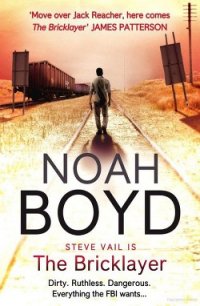Agent X - Boyd Noah (серии книг читать бесплатно .TXT) 📗
Another hundred yards ahead, he found a second bulkhead with the padlock cut away. Vail noticed that the odor in the tunnel was becoming more pungent, and he thought he could detect the slightest trace of methane. The air was stale and felt heavy in his lungs. He tried to measure his rate of breathing to see if his lungs were requiring more oxygen, but he wasn’t feeling light-headed, so it probably wasn’t going to be a problem. Besides, the shooter had apparently been through here before without a problem.
After a few more minutes, Vail found himself at a three-way fork in the tunnel. Stopping at its intersection, he turned off his light and listened. There wasn’t a sound. After turning the light back on, he could see he was standing in a couple inches of water that had accumulated because the floor at the intersection was an inch or two lower where the old switching tracks had been removed. In the left-hand passage, the floor was dry. The same in the center. The floor of the right branch revealed some partial footprints left by the shooter’s wet shoes. Vail took the right branch and after ten feet turned around and compared his tracks against those of Sakis. The rate of drying was difficult to judge, but the early tracks weren’t that much different. He was still close enough for Vail to catch.
Seventy-five yards later, Vail came to a right turn. It was impossible to tell what direction he had traveled in, but he thought it was initially south and now possibly west. As he was about to make the turn, he heard the sound of metal on metal. He peeked around the corner and saw another bulkhead with a steel gate. The man he’d been chasing, illuminated by his own small flashlight, was busy working on something attached to the ceiling of the tunnel. Vail drew his weapon and carefully inched forward.
When he got to the gate, he saw that it was chained and locked shut from the other side, separating the two men. Carefully, Vail pushed his Glock through the bars, aiming it at Sakis. He couldn’t be sure, but it looked as if three linear-shaped charges had been attached to the ceiling in a triangular pattern. Each one had wires coming down from it to an electrical detonator. Vail snapped on his flashlight and said, “I guess I’m a little early.”
Sakis looked up, unruffled, keeping his hand on the detonation box. “You are. I thought maybe I lost you at the fork. If not lost, at least delayed.”
Vail could hear a slight accent in the man’s speech but couldn’t tell its origin. “Why don’t you carefully set the box down and come over here and unlock the gate?”
“You are evidently not a student of game theory. What you are proposing is a zero-sum game—all the advantage goes to you while I lose.”
“I’m fairly certain that zero-sum games are exactly what gun manufacturers have in mind. I believe their collective motto is ‘If you have the gun, you win.’ ”
“But this detonation box makes it a non-zero-sum situation.”
“Actually, this is more like a game of brinkmanship. We’re each promising to cause the death of the other to gain an advantage. I could kill you with one shot, and if I did, you would flip that switch and set off the charges on the ceiling.”
“True,” Sakis said, smiling. He raised the box in front of his face so that Vail wouldn’t have a clear head shot and end Sakis’s life before he could throw the switch. “Do you know where we are standing right now?” When Vail didn’t answer, he said, “Directly under the Chicago River. If the blast doesn’t kill you, the tunnel will flood instantly and you’ll drown. It’s too far back to the bank to outrun it. Too bad the gate between you and me is locked, because the way out for me is about twenty yards ahead. Of course, you can’t get to it. Unless you think you can shoot that lock off, but that’s a heavy-duty lock I put on it. I guarantee a handgun won’t dent it.”
“It’ll dent you. If you even twitch, I’ll empty this magazine into you.”
Sakis smiled calmly. “There is one solution. We could each go our own way, you back to the bank and me out through the exit. A draw.”
“And what’s to prevent you from coming back and setting off those charges once I’m around the corner?” Vail asked.
He laughed. “Nothing at all. But I suspect you know that if we both stay here in this stalemate, the police will eventually find us, and I’ll lose. Or maybe we all will. So I guess I’ll just have to take a chance your marksmanship isn’t that good.”
Vail said, “You’re ten feet away, and I have a couple of full magazines. Do you really think anyone’s that bad a shot? Maybe I’m the one who should take a chance that those charges won’t go off.”
Sakis smiled. “They’re triple-primed. They’ll go off.”
Vail laughed and then in a theatrical voice said, “What we have here is a failure to compromise.” The man looked at him uncomprehendingly. “Cool Hand Lukesky?” Still there was no indication of understanding from Sakis. “I guess they don’t allow American prison movies in Moscow. Even the southern road gang is better than the gulags.”
Finally Sakis smiled as if he knew something Vail didn’t. “Exactly what compromise did you have in mind?”
“I’ll back up five feet from the gate. Then you come up to it and set down the detonator at one side. With me that far back, it would be too difficult a shot to risk hitting you through the bars. You stand at the other side as far as possible from the detonator, take the key to the gate, and throw it as far down my part of the tunnel as you can. By the time I retrieve it and come back to the bulkhead, you’ll have enough time to make it to the next turn and out of range. Once I get the key and can open that lock, you’ll be gone and I’ll be five minutes behind you. Then there’ll be no reason to set off the explosives.”
Sakis considered the proposal. Evidently this FBI agent had forgotten the gun he had shot the guard with. It was now tucked behind his back. “You have to lower your gun.”
“Okay,” Vail said, dropping his arm to his side. Then he stepped back the agreed-upon distance, never taking his eyes from Sakis’s.
Sakis figured that once he threw the key behind Vail, the agent would have to turn his flashlight away from the gate and in the other direction down the tunnel. If he did glance back momentarily, he would be watching the box, making sure Sakis was not moving toward it. As soon as he fully turned to search for the key, his own light would silhouette him, and Sakis would shoot him in the back. Then he could trip the detonation timer before making his escape.
Sakis took the detonator and set it down along the wall about a foot from the gate, so Vail couldn’t reach through and disarm it. He then moved to the opposite wall, dug a key out of his pocket, and held it up so Vail could see that it was a padlock key. “Okay?”
“Toss it.”
Sakis threw the key as far as he could, at least ten feet past the agent, who was now casually leaning against the wall. Vail gave him one last careful glance. Then he swung his flashlight around, and its beam glinted off the key on the concrete floor ahead. Vail turned the light back onto Sakis and the detonation box. “I’ve got a feeling it won’t be too long before we meet again.” He turned and started toward the key.
Sakis reached behind his back and carefully drew his gun. As he raised it, Vail dropped into a crouch, pivoted, and fired. The bullet tore into Sakis’s throat.
Vail hadn’t forgotten about the gun. He knew that Sakis would use it if Vail created a scenario in which Sakis could shoot him in the back. The ploy was the only way he could separate him from the detonation box. Vail had hoped to shoot up through his throat and sever his brain stem, not only instantly killing him but also paralyzing him so the switch could not be thrown. The odds of making the shot were astronomical, but he had no other choice. The bullet had missed by almost two inches.



